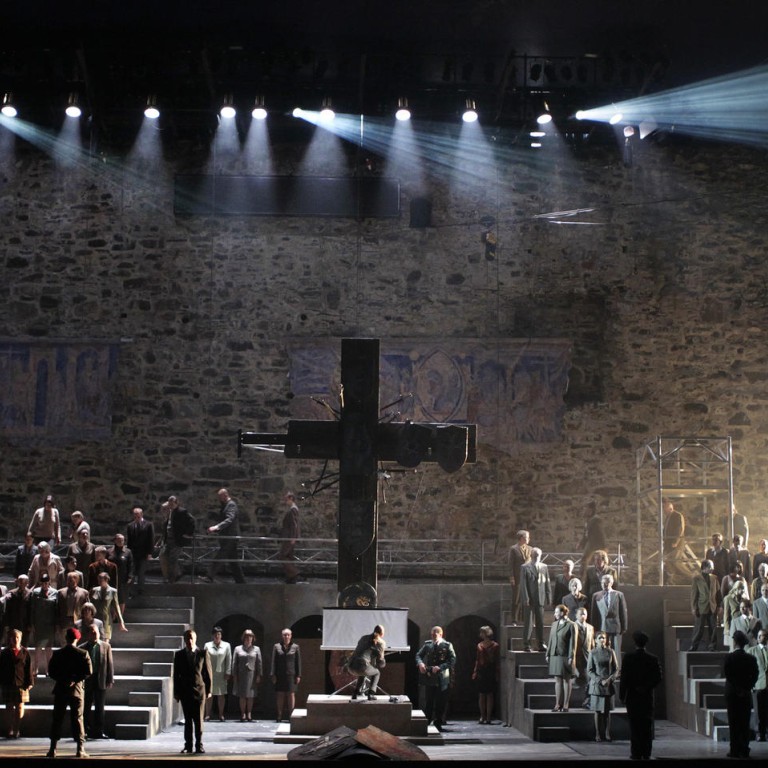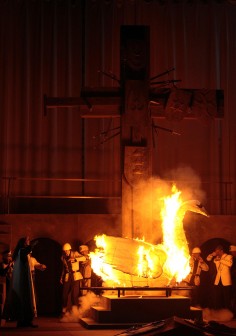
A knight's tale
Despite early reservations about Wagner, tenor Bryan Register now embodies the lead role in Lohengrin
When American tenor Bryan Register was in his early 20s he was offered a place at the Manhattan School of Music to study singing. And he received a full scholarship. But there was a mystery: they wouldn't tell him the name of the person who was sponsoring him. Then, in the week of his graduation, he was handed an envelope and told that he should probably write a thank you letter to his sponsor.
"And I said of course I will … and I opened the envelope and it was [world-famous Swedish soprano] Birgit Nilssen … I thought I was going to die," he recalls.
I have the body for [ Lohengrin], and the look. This role takes a lot of stamina
The story has a curious parallel with the opera that will have its Hong Kong premiere at the 2014 Arts Festival, in which Register will play the title role. (Advance bookings for next year's festival opened on Thursday.)
On one level the story of , based on the same Arthurian German epics that inspired J.R.R. Tolkien to write his trilogy, is like a medieval mystery thriller.
A girl and her young brother go into the woods; she comes out without him, and finds herself on trial for fratricide. And through the rest of the opera there is a question that remains to be answered: what did happen in those woods that day?

And when he wins the duel, he agrees to marry Elsa (the wedding anthem will be familiar - it is the original for the popular wedding march ) on one condition: she cannot know his name nor where he comes from.
If she asks, something terrible will happen.
Given the knight's secret name is Lohengrin, which the audience members know already, the mystery and tension are not in the name itself, but in what will happen when the name is spoken.
The production coming to Hong Kong was originally created for the wonderful summer-long Savonlinna Opera Festival in Finland's lakelands. It premiered in 2011 at the 15th-century Olavlinna Castle in Savonlinna.
It is the first time that a full opera by composer Richard Wagner has been performed in this city for more than 20 years. At more than three hours, with full cast, complicated set, and chorus of 80, it is an ambitious, exciting venture for the Hong Kong Arts Festival.
The production has been reset into 1940s wartime Germany, a period in history when the worldview of a nation turned and shifted.
It is a highly symbolic opera, and this production starts with men rebuilding things - intended to reflect how time can pass but humans repeat the same mistakes again and again. And the knight, Lohengrin, is shown as an artist, painting the world around him, with the underlying idea that the source of true creativity cannot be named, and by naming it we destroy it.
Which is all very well, but on the way along this spiritual path, the supposedly chivalrous knight is unkind to his young wife, who quite naturally wants to know a bit more about the man she is married to. "I had a hard time with the character," Register says. "I found he was mean to Elsa. If I'm Lohengrin, then Elsa as my wife has every right to ask my name."
This was the element of the opera that he and fellow cast members spoke about most to director Roman Hovenbitzer during rehearsals. Register was not fully convinced the Lohengrin character was justified, but he understood that the reason for his unkindness to Elsa "goes further than the obvious thing of asking someone's name. If you try to explain something too much then it loses its power - and its mystery."
Register has played several of the big Wagnerian tenor roles, a fact which would have surprised his younger self, when he was convinced his career was with French opera, and his two favourite composers were Rachmaninov and Bach: "I would never really listen to Wagner - I didn't like Wagner that much."
But in 2007 he had a call from an agent in New York who had heard his voice in a consultation, and she thought he should be in the Wagner programme in Washington, DC. He took German lessons at Deutsches Haus in New York.
"I have the body for [ ], and the look. This role takes a lot of stamina because it's so long," says Register, who is strongly built. "I can do it and not die," he adds, jokingly.
The thing he has grown to like about Wagner is that "it's really big, and really small", he says, explaining how, in all the grand drama, it is surprising how little he has to push his voice. "The first time I sang Tristan for my teacher she got really excited and said, 'This is your role, this is going to make you famous'. And I thought 'Lady you are crazy'. It just felt as if I didn't have to work very hard … it was so different from all the other music that I was doing. The thing is that you have to learn to trust that it is enough."
His involvement with was comparatively last-minute. Conductor Jari Hämäläinen, who was in New York in January, contacted Register because the tenor originally engaged was unable to take up the appointment.
"He asked me 'Do you know ?' And I don't know the role but I know the arias. He said I'd better start learning ."
It took him two years to learn the role of Tristan in Wagner's . He managed to learn in six months.
Hämäläinen's own first engagement with the opera was far more dramatic. When it was first performed at Savonlinna he was the overall artistic director for the festival, but Philippe Auguin, music director of the Washington National Opera, was to conduct this particular opera.
"Two years ago Philippe Auguin called me on a Friday," Hämäläinen says. "One o'clock. The show was on Saturday. He said 'My mother is dying, I am not coming'."
He had never tackled the whole opera, "so I took the scores, went home, started to study. And at 1.30 in the morning I almost ran out of belief that I could ever manage. But I worked until 4 o'clock in the morning. Then the next day I worked with [tenor] José Cura from 10am until 2pm because we had a concert with him. Then I went home and studied a little … and I don't know how I did it but it went well."
It was terrifically exciting, and the adrenaline flowed.
"But in the end it was a bad experience," Hämäläinen says, laughing. "Because after doing that I always think I still have time. If I can do in just one day, then I can do anything."
Lohengrin

